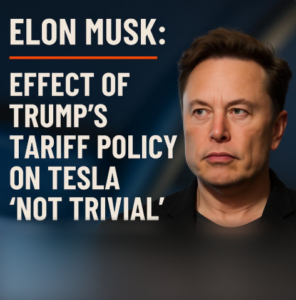In March 2025, former President Donald Trump announced a 25% tariff on imported cars and auto parts, sending shockwaves through the global automotive industry. Tesla CEO Elon Musk acknowledged this impact, warning: “This tariff will affect Tesla as well. The cost impact is not trivial.”

■ Tesla: Made in the U.S., but Not Fully American?
-
Although Tesla assembles all cars domestically, about 20-25% of its vehicle components come from Mexico.
-
Musk stressed that tariffs directly raise Tesla’s costs, significantly affecting its operations.
-
Tesla’s top-selling Model Y Long Range consists of approximately 25% Mexican components by value.
■ Supply Chain Challenges and Component Constraints
-
In a letter to the U.S. Trade Representative (USTR), Tesla highlighted that despite efforts to localize supply chains, certain parts remain difficult or impossible to source within the U.S.
-
Global supply chains involve parts crossing borders multiple times, and tariffs could result in immediate price hikes and supply disruptions.
■ Industry-Wide Concerns
-
More than 50% of vehicles sold in the U.S. are imported, raising serious industry-wide concerns.
-
Art Wheaton from Cornell University estimated that the tariffs could increase consumer prices by up to $20,000 per vehicle.
-
German automakers warned that these tariffs represent a “fatal signal” that could hinder both U.S. and global economic growth.
■ Are Cars Actually ‘Made in USA’?
-
Even seemingly U.S.-built vehicles often have substantial foreign content.
-
For instance, the Cadillac CT5 is assembled in Michigan but nearly half of its components come from Mexico.
-
The Ford Mustang Mach-E derives 78% of its value from Mexican components, with just 13% from the U.S. and Canada combined.
§ Conclusion: Tariff Impact Highlights Vulnerability in Global Supply Chains
-
Despite Tesla’s significant U.S. production, the structure of its component sourcing means avoiding tariffs entirely is impossible.
-
The broader U.S. auto industry, despite domestic manufacturing, remains vulnerable to international trade disruptions.
-
Automakers worldwide will likely need increasingly complex strategies to navigate evolving trade policies.

Very good https://lc.cx/xjXBQT
Good https://is.gd/N1ikS2
g8an6b
Super https://shorturl.fm/6539m
https://shorturl.fm/9fnIC
https://shorturl.fm/5JO3e
https://shorturl.fm/68Y8V
https://shorturl.fm/TbTre
https://shorturl.fm/68Y8V
https://shorturl.fm/A5ni8
https://shorturl.fm/a0B2m
https://shorturl.fm/XIZGD
https://shorturl.fm/68Y8V
https://shorturl.fm/a0B2m
https://shorturl.fm/FIJkD
https://shorturl.fm/XIZGD
https://shorturl.fm/j3kEj
https://shorturl.fm/6539m
https://shorturl.fm/oYjg5
https://shorturl.fm/68Y8V